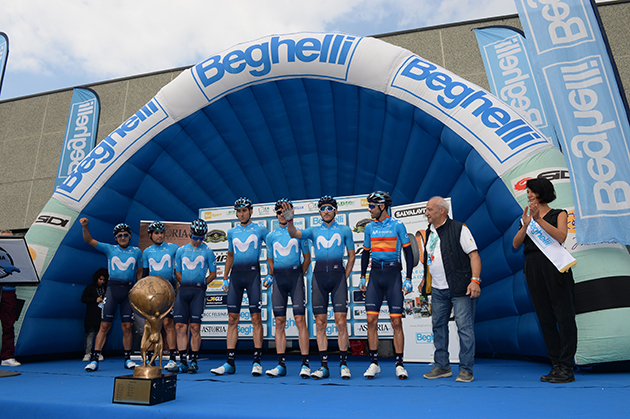Bicycle Racing News and Opinion,
Wednesday, July 1, 2020
Back to news and opinion index page for links to archived stories | Commentary | Our YouTube page
2019 Tour de France | 2019 Giro d'Italia
Fill the unforgiving minute with sixty seconds worth of distance run. - Rudyard Kipling

Important upcoming racing, according to the UCI revised calendar:
- August 1: Strade Bianche
- August 5-9: Tour of Poland
- August 7-9: Tour de l'Ain
- August 8: Milano-San Remo
- August 12-16: Critérium du Dauphiné
Latest completed racing:
- May 1-3:
Vuelta Asturias - May 1:
Rund um den Finanzplatz Eschborn-Frankfurt - April 22-26: Digital Swiss 5
Movistar Team aims to become first 100% sustainable cycling organization
Here is the team's announcement:
In a world suffering from a climate emergency, where the humanity makes big efforts to alleviate the consequences of their own damage to our planet, Abarca Sports and the Movistar Team are announcing a series of measures, to start in the summer of 2020, that hope to carry that momentum forward, as they become the first top-tier cycling team 100% sustainable in its activities. That aim is aligned with the Sustainable Development Goals adopted by the United Nations for 2030.

Team Movistar at the start of the 2019 GP Beghelli. Sirotti photo
As a first move, the organisation managing the Telefónica-backed teams has measured its carbon footprint. The Greenhouse Gases generated by the team’s vehicles and the energy used at its headquarters add up to an equivalent 175,000kg of carbon dioxide (CO2) every year. Abarca Sports aims to offset and reduce these emissions in the next few years, through a set of actions already in place.
The Movistar Team is fully committed to use 100% renewable energy sources in its main building en Pamplona, and will also cover some of its demand through self-consumption, with solar panels being installed over its HQ. Another big effort will see the team gradually replace its fleet of vehicles, Volvo cars, with new hybrid models, seeking to reduce its CO2 emissions.
Abarca Sports has also passed the importance of these values on to all of its members during the current non-racing period, and will put into significant efforts to support sustainable mobility and the environment in its local area. All of that, with a first milestone in mind: obtaining the Seal of Recognition from Spain’s Ministry for Ecological Transition (MITECO).
The Eusebio Unzué-led company thus aspires to put themselves at the front of cycling in this specific area, the sport always being considered ‘green’ yet with a serious impact on the planet with its competitive activities, which the Blues now aim to reduce. A determined effort during the COVID-19 pandemic, still going in most areas of the world and bolstered, to an extent, by the pollution which affects the respiratory system.
Domestic bicycle industry manufacturers feed the boom
Bicycle Retailer & Industry News sent me this:
FREEPORT, N.Y. (BRAIN) — Some of the bike products most in demand during the current mini bike boom — things like kickstands, indoor trainers, and car racks — happen to be available from domestic manufacturers. Companies with U.S. factories are ramping up quickly to meet demand while importers struggle with delays from their offshore suppliers.
"We're working as hard as we can, we are inundated with orders," said Peter Greenfield, owner of Greenfield Industries, which manufactures aluminum kickstands on Long Island.
Greenfield shut down its factory in April because of COVID-19 restrictions but re-opened in May. Since then, the company's roughly 40 workers are working overtime and Greenfield is contemplating adding a second shift.
Greenfield had slow 2019 sales and was expecting they would continue into 2020. So inventory was low before the pandemic. "I couldn't have anticipated this," he said.
Domestic manufacturers are challenged by distancing and hygiene requirements that reduce capacity and increase costs. In some cases they struggle with the availability of imported components and materials, as well. Greenfield doesn't use any foreign parts in its kickstands, but the company also makes cast aluminum electric junction boxes that rely on a part that is unavailable domestically, and production has slowed because of the lack of availability of that part from oversees.
But importers have more challenges: longer lead times, increased shipping costs, tariffs, and in some cases offshore factories that are still operating at less than full capacity.
In Madison, Wisconsin, Saris finds itself making products to supply two categories that are currently booming: car racks and indoor trainers.
Normally those categories are counter-seasonal so the company can focus its production on one at a time, said Chris Fortune, Saris' CEO. This year, not so much; Saris is operating assembly lines for both categories.
"Since things have opened up, the rack business is very strong. We are working at catching up. The team has done an amazing job turning the faucet on for trainers (production) and now for racks," Fortune said.
Saris has added more factory workers, who operate in three teams that work and break together to reduce the change of COVID-19 infections. Other workers are operating remotely.
You can read the entire story here.
Back to news and opinion index page for links to archived stories | Commentary









